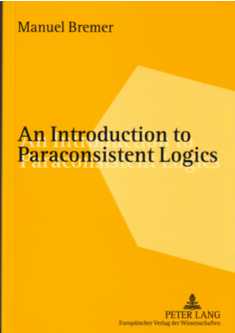|
These
lectures give an overview on Paraconsistent Logics.
Paraconsistent Logics are logics that allow
for inconsistency. Allowing
for that makes them non-classical, even more so one is inclined
to say than are, for example, many valued approaches. Nonetheless
they are worth considering:
- Logical systems are worth considering in their own right, since
so we learn about very abstract structural properties of logics and
the concepts employed within them (e.g., negation, necessity, consistency
...)
- Some non-classical logics are especially of interest from a philosophical
perspective, since only by them some philosophical problems can
be solved or even be stated.This
introduction argues from a philosophical perspective why (some) paraconsistent
logics are interesting or even the best candidates for treating some
specific philosophical problems.
Although
logic is seen from the point of view of its philosophical use, various
formal systems are described, compared and employed.
This
introduction is written for:
- Philosophers who have heard of these new systems, having
some idea what they might be good for, but are still looking for
a readable more general introduction.
- Information scientists interested in the treatment of
inconsistent data and their consequence relation.
- Mathematicians who care about the foundational problems
of set theory, or have even heard of
inconsistent arithmetic or such things.
- Linguists interested in formal methods and the philosophical
foundations of semantics or the theory of formal languages.
- Anyone interested in the paradoxes of semantics, set
theory ..
It
is assumed that the reader has mastered a course in classical
(or as I rather say standard) First Order Logic, has heard at
least in general about meta-logical properties of logical systems
(like soundness) and about the idea of modal logics and their
semantics (possible worlds...). It
is surely helpful if the reader has some background knowledge
in the philosophy of logic and language (especially semantics),
or such philosophical fields as epistemology, ontology or meta-ethics.
The
lectures are divided into the following parts:
1. Introduction
(last update: 17.06.2005)
Foundations
This part presents the basic philosophical motivation for
paraconsistent logics (abbreviated PL), introduces some
methodological guidelines for developing or choosing PLs and
describes the different ways (i.e. systems) how one can develop
PLs.
Applications
This part employs some of the PLs or extensions thereof to
deal with topics in set theory, meta-logic, semantics, epistemology,
and meta-ethics.
Discussions,
Alternatives and Perspectives
This part confronts the whole approach with some problems
(ontology, hypercontradictions) and discusses some alternatives
to PLs.
Each
chapter
- contains at the end one slide with some questions on the
topic of that chapter inviting you to reflect on some of the
issues or to grasp the crucial points more clearly
- contains one slide with more formal exercises asking you
to employ the methods just dealt with
- contains a list of further readings; here the primary sources
of the chapter are given and texts with which you might continue
on the topic in question (general references are listed in
these Further References)
The
chapters in Part I are more or the less self-contained, the
chapters in Part II obviously presuppose the PL-systems introduced
in Part I.

|

